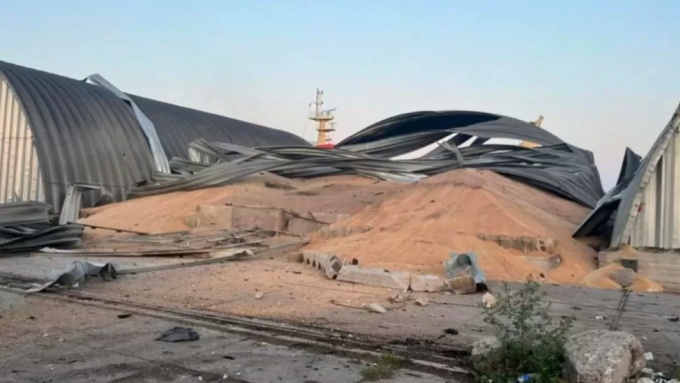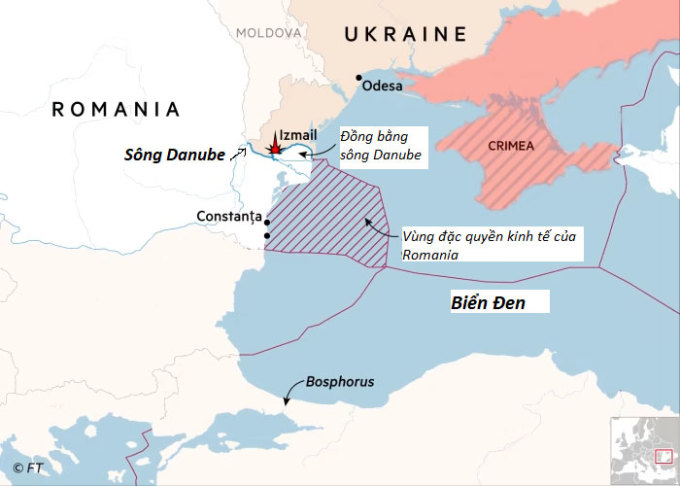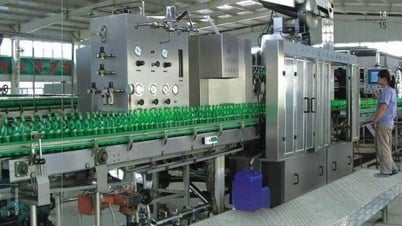After withdrawing from the Black Sea grain deal, Russia focused its efforts on attacking seaports and Danube River ports to try to prevent Ukraine from exporting agricultural products.
The Black Sea Grains Initiative, negotiated by the United Nations and Turkey and signed in Istanbul in July 2022, will allow Ukraine to export millions of tons of corn, wheat and other agricultural products by sea to world markets.
Since the initiative began in August 2022, nearly 33 million tons of Ukrainian grain have been exported across the Black Sea, before the last cargo ship left the Eastern European country on July 16. Russia announced on July 17 that it was terminating the agreement.
After withdrawing from the deal, Russia launched a series of airstrikes on Odessa, one of three Black Sea ports that are crucial for Ukraine’s grain exports. The raid on two warehouses in the city of Chornomorsk, in Odessa region, on the night of July 19 destroyed about 60,000 tons of agricultural products, according to Ukrainian officials.

A grain warehouse in the port of Reni, Odessa province, was damaged after a Russian attack. Photo: BBC
After repeatedly launching missiles and unmanned aerial vehicles (UAVs) at Ukraine's export ports along the Black Sea coast, Russia has shifted its focus to inland ports along the Danube River, located on the border between Ukraine and Romania.
Ukraine now relies heavily on these river ports to export grain to neighboring Romania, from where it is shipped further afield.
Ukrainian officials said Russia had repeatedly attacked the river port system in September, including a three-hour drone attack. The attack on Reni sent debris flying about 200 meters from the border with NATO member Romania.
The Zatoka Bridge, a key route allowing grain trucks to enter the port of Izmail on the Danube, has also come under repeated attack.
“With the grain deal suspended, Ukraine’s maximum grain export capacity, which relies on river, road and rail, will drop to 2.5 million tonnes per month,” said Mariia Bogonos, an agricultural policy expert at the Kiev School of Economics .
Most of this grain is transported via the Danube River, Ukraine's main export waterway today, said Andrey Sizov, an expert on the Black Sea agricultural market.
Observers say Russia’s repeated attacks on Danube ports could further disrupt the flow of Ukrainian grain, with knock-on effects for Europe and the world, further boosting global wheat prices, which have risen more than 10% since the collapse of the Black Sea Grain Initiative.
Dozens of grain ships are plying the Danube and waiting at its mouth, according to global shipping market tracker Lloyd's List. The narrow waterway on the Danube makes it difficult for ships to navigate as freely as they can on the Black Sea.

Location of the Danube River and the Black Sea region. Graphic: FT
Lloyd's List said the increased risk at Danube river ports from Russian attacks has forced many traders to assess the viability of Ukraine's remaining grain export routes.
Grain can also be transported by truck or train, but agricultural experts say this is not a cost-effective option.
“The reason grain is shipped in large volumes by ship is because it is cheap. Other routes would add costs, which would drive up grain prices,” said Mike Lee, an agricultural expert specializing in Eastern Europe.
As Ukraine abandons its Danube river ports in favor of increasing grain exports by rail or road, those routes could easily become Russia's next targets, Lee added.
“If Russia is determined to block Ukraine’s grain exports, it will start attacking the railway infrastructure. They haven’t done so yet, but that could be the next step,” he said.
Thanh Tam (According to BBC )
Source link




![[Photo] More than 17,000 candidates participate in the 2025 SPT Competency Assessment Test of Hanoi National University of Education](https://vphoto.vietnam.vn/thumb/1200x675/vietnam/resource/IMAGE/2025/5/17/e538d9a1636c407cbb211b314e6303fd)
![[Photo] Readers line up to visit the photo exhibition and receive a special publication commemorating the 135th birthday of President Ho Chi Minh at Nhan Dan Newspaper](https://vphoto.vietnam.vn/thumb/1200x675/vietnam/resource/IMAGE/2025/5/17/85b3197fc6bd43e6a9ee4db15101005b)
![[Photo] Prime Minister Pham Minh Chinh chairs meeting on science and technology development](https://vphoto.vietnam.vn/thumb/1200x675/vietnam/resource/IMAGE/2025/5/17/ae80dd74c384439789b12013c738a045)





























![[Photo] Nearly 3,000 students moved by stories about soldiers](https://vphoto.vietnam.vn/thumb/1200x675/vietnam/resource/IMAGE/2025/5/17/21da57c8241e42438b423eaa37215e0e)







































































Comment (0)